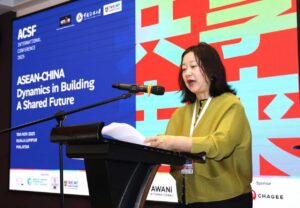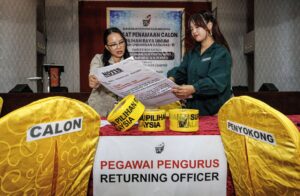
KUALA LUMPUR: China has proven to be a credible partner to both South-East Asia and Asean, embracing multilateralism and regionalism while acknowledging the value of cooperation, says an academic.
Universiti Kebangsaan Malaysia’s Prof Dr M. Ravichandran (pic) said this could be seen through China‘s participation in Asean-China Free Trade Agreements and also the Regional Comprehensive Economic Partnership (RCEP), among others.
“They are also learning the way of Asean, which is consensus building and dialogue,” he said.
He said that in recent times, China’s relations with South-East Asian countries are marked by deep, complex and rapidly expanding economic relations, fuelled by trade, investment and infrastructural programmes.
While matters pertaining to the South China Sea continue posing substantial hurdles, Ravichandran said the issue is frequently addressed through diplomatic and foreign policy channels within Asean.
“China is present in many of the dialogues, including the Asean Plus Three, and are also members of the Asean Regional Forum and East Asia Summit.
“There are many dialogue forums and Asean-led mechanisms to engage China on this front,” he said.
He also highlighted historical and cultural links between China and Southeast Asia, noting the sizable Chinese diaspora both in Malaysia and other South-East Asian countries.
“People-to-people and cultural exchanges, including educational, tourism, collaborations, are important and it is growing,” he said.
South-East Asia, he said, has also become a popular tourist destination for Chinese nationals, adding that this trend has attracted widespread attention in Malaysia and its regional neighbours.
Ravichandran said this during his keynote address titled “Challenges to Asean-China Relations in an Uncertain Regional Order” held during the Asean-China Dynamics in Building a Shared Future conference held here on Saturday (Nov 15).
Separately, Universiti Malaya’s Dr Lam Choong Wah proposed the formation of a security or international relations-related committee under the Asean Inter-Parliamentary Assembly (AIPA).
He said this would enhance parliamentary diplomacy for Asean stakeholders.
Lam also proposed focused engagement with China’s National People’s Congress and the Committee of the Chinese People’s Political Consultative Conference (CPPCC).
“We have to encourage and promote an exchange between parliaments and also to make parliamentary diplomacy as the active channel for both the people, lawmakers and stakeholders to voice up,” he said in a presentation titled “A Parliamentary Way of Achieving Peace and Building Trust between Asean and China” during the same conference.
Lam was also of the view that Asean should engage with more regional partners to mitigate situations such as rising geopolitical dynamics due to big power rivalries, tariff wars as well as technology and supply chain competition.
“Why multilateralism? It’s because we believe that international matters cannot be solved by one country alone,” he said.






